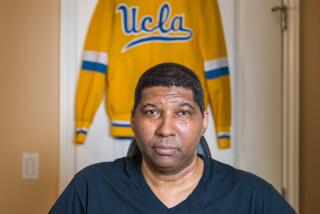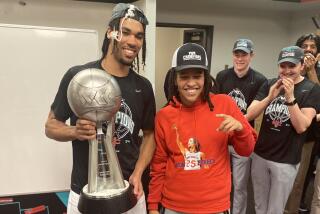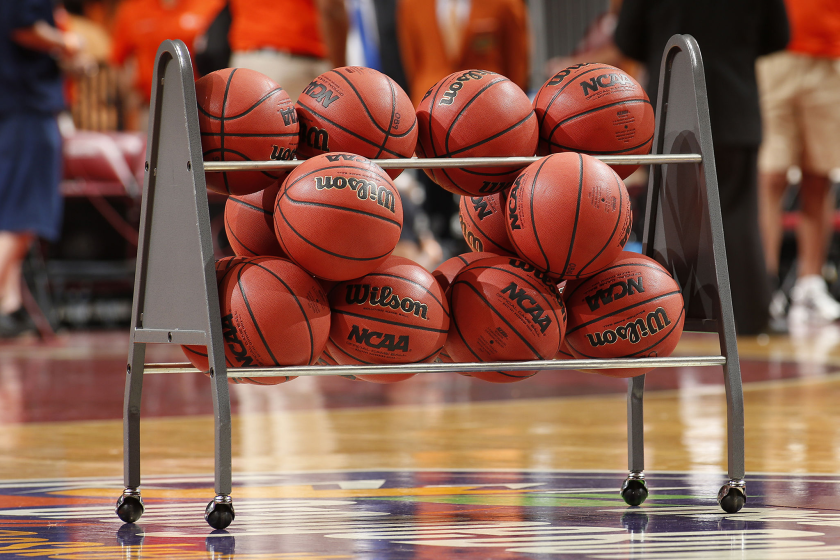Roe’s NBA Future Is Still Evolving
- Share via
The next three weeks could distinguish Lou Roe for the rest of his life.
Roe? Had a great tournament back in ... well, it was the year after Arkansas won it all for the first time, so that’s got to be ’95. He brought UMass to the: a) Final Four; b) Championship game; c) National championship.
(Answer forthcoming.)
Roe, a senior forward at Massachusetts, a first-team selection by coaches in The Sporting News’ All-America balloting, arguably is the best college player without a secure pro future.
With a power forward’s style and heart but a small body, Roe faces a monumental challenge of retooling his game to have any chance at making an impact and lasting in the NBA. He is listed at 6 feet 7, confesses to 6-6 and change, and probably is shorter. He lists at 220 pounds but probably is lighter. He needs to bulk up to match the strength of the game’s best short power forwards, Larry Johnson and Charles Barkley.
If UMass advances to the Final Four, Roe could end up the next Ed Pinckney, who is having a journeyman’s NBA career but was the driving force on Villanova’s unlikely national championship team in ’85. Or Roe could be the next Keith Smart, who is remembered as the guard who shot Indiana to the national title in ’87 -- and couldn’t stick for long in the NBA.
Especially because UMass Coach John Calipari threw senior guard Mike Williams off the team on February 20, Roe and sophomore center Marcus Camby must have compelling tournaments for the Minutemen to make it to Seattle. Williams was UMass’ major outside shooting threat, and his absence will allow opponents to tighten the defensive pressure on Roe and Camby. Yet in this season of mercurial performances and surprises, beginning with UMass’ 24-point rout of Arkansas on November 25, it wouldn’t be a shock to see Roe on the winning team April 3.
“I’m doing the things to help this team,” says Roe, who is averaging 17.2 points and 8.3 rebounds in 29 games this season but has only 50 assists, 32 blocks and 14 steals. “I’m not worried about the pros. This is my senior season, and I have to do whatever it takes to win the national title.”
Roe is the type of player you catch yourself admiring from press row, from the seats, from in front of the television. You are not impressed so much by what he does, as much as you are by how he plays. His uniform is the first to be sweat-drenched.
A relentless rebounder, he has a don’t-back-down-from-anybody game. He will stuff over a center once or twice a season, punctuating it with a snarl that draws an out-of-character taunting technical.
“I know I can mess up some 7-footers’ minds,” Roe says. “They’re thinking, ‘How in the hell can he score on me?’ ” Roe will post up a big forward, outrun smaller men down the floor, take the guard catching the inbounds pass in the full-court press or pick up the point guard coming across the center line. While Camby was sitting out with an inju red hamstring, Roe even spent part of a home game against George Washington guarding 7-foot Alexander Koul.
But for all Roe’s versatility, the defining moments of his collegiate career come inside, near the glass, the NBA territory of much bigger men.
Roe talks about going out with that national championship, perhaps cracking the NBA draft lottery and becoming the first player from his program to make the NBA since Julius Erving and Al Skinner, now the coach at Rhode Island.
“My heart is going to take me wherever I want to go,” he says. It is the understandable optimism of a man who has found hard work and competitive enthusiasm to have made him a star in college.
“You watch him and you think he’s 6-foot-9 and 250 pounds,” UMass guard Derek Kellogg says. “You get up close and he’s not that big. But he’s a fierce competitor. Just ferocious.”
Kellogg then laughs and gives an example. Maybe 20 minutes earlier on the night of this interview, Roe snarled to Kellogg during one stretch of UMass offensive anarchy against Duquesne: “Grab the (bleeping) ball and run the play.” He is not a get-on-a-soapbox leader; Calipari, after trying to goad Roe into that role, has learned to accept it.
“Lou is the heart and soul of this team,” Camby says. “Every day, he comes to play hard. Practice. Games. He just goes out there and battles, and you have to follow his lead.”
Roe says he “can be the toughest SOB you’ve ever been around. I’m really tough on the floor when people push me, try to test me and challenge me, when they say I can’t do things. I want to prove them wrong.”
Roe’s next challenge will be to prove the pro scouts wrong. They say he is undersized for that 82-game NBA pounding inside and that he hasn’t shown if he can shoot, run or handle the ball well enough to play small forward or big guard, let alone point guard. Roe played well in the Goodwill Games last year, filling that swingman’s role and averaging 11.8 points in the international competition.
“People saw how I could play big guard and small forward in the Goodwill Games, and I still have a whole lot of room to get better,” Roe says. But with the exception of one ugly exhibition loss to Dream Team II, the team didn’t play against much NBA talent.
For now, Roe is projected as a mid-to-late first-round pick in the draft, but the NBA men watch March Madness with interest, too. This time of tournament pressure is another step in the scouting process, which will continue in the postseason camps. Roe will be one of those monitored closely, in part because even the pro personnel evaluators find themselves admiring Roe and perhaps even rooting for him to defy their own conventional wisdom.
“He’s the wrong size for his game,” one NBA scout says. “It’s all 15 feet and in.” The scout says this with as much regret as dismissal; he admires Roe’s zeal but must heed the realities of NBA roles as they have evolved in the league of the ‘90s. An NBA forward can’t bang with Charles Oakley with a body type that resembles, say, those of Nick Anderson or Dan Majerle.
Calipari says that if Roe had tried to answer those NBA doubts about his game this season, UMass would have suffered. “Lou shoots the ball from the perimeter better than everybody gives him credit for,” Calipari says. “He handles the ball better than people give him credit for. But right now, he understands that he makes his mark for us because of the fact that from 10 feet and in, there’s nobody better in college basketball. This team knows he’s selfless. That’s so important when you’re talking about a kid who’s in one sense playing for a contract and a spot in the draft. But he still doesn’t worry about that. He’s still playing basketball the way this team needs him to play it, and that means that when he gets the money, he’s not going to be the type who becomes a different person. He’s not changing. He’s going to remain Lou Roe.”
Yes, the NBA wants the right body to go with the heart.
But nobody doubts Lou Roe’s heart.
Nobody.
Roe was raised in Atlantic City, the New Jersey beachfront city of Miss America’s coronation and Don King-promoted fights; of pizza, taffy and tacky T-shirts on the boardwalk; and, contrary to some of the most naive expectations, of residential poverty and trouble that didn’t abate when the casinos opened.
As a University of Pittsburgh assistant, Calipari had helped recruit Bobby Martin. Martin started pitching his cousin, a junior-high player in Atlantic City named Lou Roe. When Calipari got the UMass job in 1988, inheriting a moribund program playing in a tiny, decrepit arena called the Curry Hicks Cage, his staff began courting Roe. He was in the ninth grade.
Roe’s mother married Richard Henderson, a chef at the Trump Plaza Hotel, two years later. Lou, his sisters and his mother soon moved with Henderson out of the Chelsea Heights neighborhood to Brigantine, across a bridge from Atlantic City. When the time came to make his collegiate choice, Roe gave UMass credit for being the first to show interest. His signing to a letter of intent marked the first time Calipari landed a nationally touted recruit, and it was part of the revitalization of the program that led to the construction and opening of the new on-campus arena, the Mullins Center, midway through the 1992-93 season.
“His mother’s a special lady,” Calipari says. “He had his head screwed on straight. We lose kids when the ego comes into it, and the glitter of a more established program comes into it. Not with this guy. He was not blinded and that was because of his mom. His mom still calls me and says we’re doing a good job. Now, that’s not usually what parents call about. Usually, it’s ‘My son, my son.’ Not her. When we were in their house and talked about our goals for her son, she was paying attention. She still remembers them. Every one.”
Roe was the first forward off the bench as a freshman, when the Minutemen reached the 1992 NCAA regional semifinals, losing to Kentucky. He was All-Atlantic 10 as a sophomore and a second team TSN All-America last year, when the addition of the shot-blocking Camby in the middle took some of the pressure off Roe.
Last summer, in part because he understood the necessity to work on his perimeter game, he worked out in the old Hicks Cage, dribbling through chairs and putting up jumper after jumper. But when the season opened, he didn’t get carried away and start imitating Mark Price or Dennis Scott, instead sticking to his inside game. He got off to a superlative start, going head-to-head with Arkansas’ Corliss Williamson and finishing with 34 points and 13 rebounds in UMass’ 104-80 victory.
“I always thought Lou Roe was a great player,” Arkansas Coach Nolan Richardson said after that game, “but now that I’ve seen him in person, I know he is. You may see a kid on television, but that doesn’t show you the whole story. When you watch in person, it’s a totally different story than on TV or on tape. I watched how well he moved without the ball, how he rebounded and how he passed. He did everything you can do to win the ballgame. That’s my impression. He’s a great player.”
“If you’re looking for a player who’s a warrior,” says Calipari, “who comes every night, who is a fierce rebounder and one of the nicest people you’d ever want to meet, then you’ll take Lou and say you’ll give up a little bit of shooting.’
“But you know what? He can shoot. He doesn’t worry about that for us. He does what he has to do for us to win.”
It might even get them to Seattle.
More to Read
Go beyond the scoreboard
Get the latest on L.A.'s teams in the daily Sports Report newsletter.
You may occasionally receive promotional content from the Los Angeles Times.










